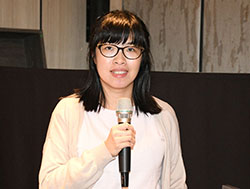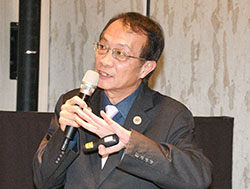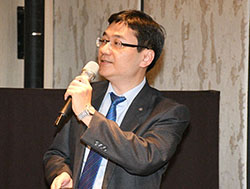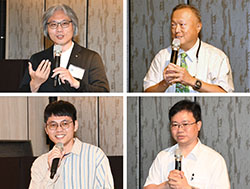
本會於2024年4月14日假台北晶華酒店地下三樓晶英會舉行「祐生國政聯誼會」。由主持人黃晉英秘書長宣布後揭開當日活動序幕,在輕鬆、活潑的節目之下,隨即由主持人帶來重要訊息:「台海局勢緊張,而菲律賓與中國在南海的衝突,更是不容忽視的危機。日本學者認為,習近平的年齡是他決定是否對台灣動武的重要因素,可能在未來10年內採取行動。因此,台灣仍應積極強化自我防禦能力,對外展現自我防衛的決心。在經濟方面,過去許多企業在中國設廠,而隨著中美貿易戰開打,台商供應鏈已逐步遷徙,高階回台灣,中低階則移往東南亞,形成新趨勢。最後提醒大家,在氣候異變及外在情勢混亂之下,我們仍要站穩自己的腳步,往正確的道路前進!」
The April Archilife Public Policy Communion of 2024 was held on April 14, 2024. After a series of relaxing and fun activities, Secretary General Huang Chin-ying made the following announcement, "The tensions across the Taiwan Strait and the ongoing conflict in the South China Sea between China and the Philippines are crises that must not be overlooked. Japanese scholars believe that Xi Jinping's age is a major factor in his decision to use force against Taiwan, possibly within the next decade. As a result, Taiwan should keep actively enhancing its capacity for self-defense and displaying a resolve to defend itself. Many businesses had previously established factories in China due to economic reasons. However, with the onset of the US–China trade war, Taiwanese supply chains have gradually shifted, with higher tiers returning to Taiwan and intermediate and lower tiers relocating to Southeast Asia, creating new trends. Ultimately, this serves as a reminder to all individuals to find their footing and persist along the correct trajectory in the face of climate change and external chaos!"

緊接著進行專題演講,由生活特組組長鄭瑋寧小姐進行「生活特組2023年下半年階段研究成果報告」。主講人首先表示現階段研究任務,為根據氣候異變的演變趨勢與疫後人類的生存挑戰,進行發想與研討,期能作為祐生擘畫下一個永續新世界的重要指引。2023年上半年的研究是:分析環境變異、科技發展、智慧轉型的趨勢,進而研擬從共生與數位轉型為智慧化生活之方案;本階段的研究則是根據2023年上半年的研究成果,進一步探討AI科技的發展趨勢、衝擊因應及其與求生存、謀生計、延生命關係最密切的醫療、建築、能源、農業、教育等領域之應用。主講人表示,未來若有更新的研究成果,將再與所有夥伴分享。
Next on the schedule was the keynote speech. First, Ms. Cheng Wei-ning presented a speech on the "Archilife Living Special Team's Research Result Report for the Second Half of 2023". The speaker began by stating that, given the challenges of climate change trends and post-pandemic human survival, the current research mission is to engage in idea development and discussion, which are expected to serve as an important guideline for planning the next sustainable world. The research in the first half of 2023 included an analysis of environmental change, technological development, and the trend of smart transformation, resulting in the formulation of smart living plans based on symbiosis and digital transformation. This stage of research builds on the findings from the first half of 2023 to delve deeper into the development trends of AI technology, responses to impacts, and applications in medicine, architecture, energy, agriculture, and education that are most directly related to survival, livelihood, and life extension. The speaker stated that she would share the most recent research findings with all members as soon as they became available.

接著由國政委員林得恩先生主講「AI支援氣象防災」。主講人首先指出嚴重災害造成人員傷亡、家園破碎,因此,團隊嘗試利用各種先進設備,期望能預測災害的發生。如今,AI加入氣象研究的行列,能節省許多人力與能量。主講人表示研究團隊以機器學習方式,蒐集坡地災害崩塌影響因數,以處理非線性問題,表現良好之方法「支持向量機」為基礎,建置崩塌潛勢評估模式。若能預知崩塌熱區,對於防災調度安排及人員撤離的政策相當重要。主講人也分享案例,於2023年藉由預報系統,成功支援颱風防災。主講人最後感性表示,現階段AI仍無法取代人類決策,面對氣候異變所帶來的極端天氣,未來仍有很長的路要走,請大家快跑前進,勇於突破!
Next, Mr. Lin De-en spoke on "AI-Assisted Meteorological Disaster Prevention". The speaker began by stating that serious disasters result in injuries, casualties, and the destruction of homes. As a result, the team attempted to use a variety of advanced equipment in the hopes of preventing disasters. Today, artificial intelligence has joined the meteorological research team, saving a significant amount of time and energy. The speaker mentioned that the research team collects impact factors of slope disaster collapse using machine learning to deal with nonlinear problems. The collapse potential assessment model has been developed using "support vectors" that demonstrate sound performance. The predictability of collapse hotspots is crucial for disaster prevention, dispatch, and personnel evacuation policies. The speaker also shared examples of successful typhoon disaster prevention using the forecast system in 2023. Lastly, the speaker tenderly acknowledged that AI is not yet capable of substituting human decision-making and that much progress remains in addressing extreme weather caused by climate change. Everyone is required to make a swift forward stride and muster the courage to break through!

接著由國政委員周裕清先生主講「台灣糖尿病防治經驗與成效」。主講人首先指出,根據統計台灣目前大約有兩百萬人患有糖尿病,且20歲至39歲年輕人占比逐年上升,凸顯了採取有效早期預防和控制措施的必要性。事實上,台灣於2001年已由衛生福利部發起糖尿病共同照護計畫,大部分基層診所、各層級醫院參與其中,透過共同管理模式確實提高糖尿病照護品質。而健保署的糖尿病整合照護計畫、社區醫療群和家庭醫師制度及新陳代謝症候群防治計劃等,也可望在2030年實現世界衛生大會(WHA)訂定的五項糖尿病目標。主講人期許透過加強健康教育及政策施行,有助於糖尿病防治。
Next, Mr. Chou Yu-ching spoke on "Taiwan's Experience and Effects in Diabetes Prevention and Treatment". The speaker began by pointing out that according to statistics, approximately two million people in Taiwan have diabetes, with the prevalence increasing annually among young people aged 20–39 years old. This highlights the importance of implementing effective early prevention and control measures. In 2001, the Ministry of Health and Welfare launched the Diabetes Co-care Plan. The plan involved the majority of primary clinics and hospitals at all levels. The co-management model did, in fact, improve the quality of diabetes care. On the other hand, the National Health Insurance Administration's Integrated Diabetes Care Plan, community medical group and family physician systems, and metabolic syndrome prevention and treatment plans, among others, are expected to achieve the World Health Assembly's (WHA) five global diabetes targets by 2030. The speaker hoped that improving health education and policy implementation would aid in the prevention and control of diabetes.

演講完畢,黃晉英秘書長代表基金會致贈謝禮予主講人。接著在與會者紛紛利用「餵豬時間」提出個人意見與看法交流後,圓滿地結束四月份國政聯誼會。
After the speech, Secretary General Huang Chin-ying presented a gift to the speakers on behalf of the foundation. Then, attendees expressed and exchanged their opinions and views during the piggy hour. The April Archilife Public Policy Communion ended smoothly.